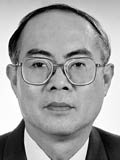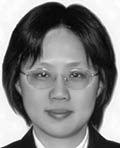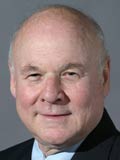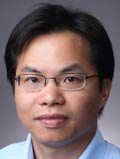Arch for Health studio, lectures to focus on China's healthcare needs

Xiqiu Huang

Ying Zhou

George Mann

Xuemei Zhu

Zhipeng Lu
It’ll be a busy fall semester for Texas A&M Architecture for Health students, who will hear a series of public lectures about China’s rapidly changing healthcare needs and design an eye hospital in Puyang, China with counterparts in China and Oklahoma.
Chinese and U.S. healthcare design experts will deliver a series of lectures during the semester, most beginning at 11:30 a.m. Wednesdays at the Wright Gallery in building A of the Langford Architecture Center.
“China has a growing, aging population, a large rural to urban migration, and a growing economy, conditions which will need to be addressed by its health care system,” said George J. Mann, Texas A&M professor of architecture, who organized the lecturers’ appearances and will lead the studio with Xuemei Zhu and Zhipeng Lu, assistant professors of architecture.
The changing conditions have created a rising need and expectation for quality, affordable, appropriate and accessible health and hospital facilities, said Mann, the who holds the Skaggs and Sprague Endowed Chair in Health Facilities Design.
One of the highlights of the speaker series will be a 10:00 a.m. Friday, Nov. 4 roundtable at the Wright Gallery, building A of the Langford Architecture Center, discussing the future of China’s healthcare facilities with Xiqiu Huang, chief architect of Beijing’s Institute of Project Planning and Research, one of China’s largest healthcare facility design and construction firms.
He’ll be joined by Ying Zhou, associate professor of architecture at Nanjing’s Southeast University, and representatives from 10 top U.S. healthcare design firms including Perkins + Will, The Innova Group, RTKL and Shepley Bulfinch.
Other experts from China and the U.S. will explore topics including “A Comparison of the Health Issues and the Healthcare Systems in China and the U.S.” Sept. 14, “Case Studies: Health and Hospital Facility Projects in China” Oct. 12 and “Designing Hospitals in China: an American Architect’s Experience” Oct. 19. Lectures are scheduled to begin at 11:30 a.m. in the Wright Gallery.
In the Architecture-for-Health design studio, students from Texas A&M, Southeast University and the University of Oklahoma will initially communicate by teleconference, telephone and emails, said Mann, as they research Puyang’s health issues, climate, culture and materials and methods of construction.
In early November, they will converge at HKS Inc. In Dallas to present their designs to representatives from Beijing’s Institute of Project Planning and Research, one of the largest health facilities design and construction firms in China.
Later that month, students will meet medical facility design professionals, listen to presentations and view healthcare facility exhibits at the [Healthcare Design] (http://www.healthdesign.org/chd/conferences-events/healthcare-design) conference in Nashville, Tenn, the world’s premier gathering devoted to evidence-based design for healthcare buildings.
In October, Mann will head to Southeast University in Nanjing to present the studios’ projects to faculty and students.
Developed in collaboration with design professionals engaged in the day-to-day championing of higher quality healthcare environments, the annual learning event examines the ways evidence-based design strategies can positively impact the safety, operation, clinical outcomes and financial success of healthcare facilities now and in the future.
Tags
Related Posts

Experts to discuss tech’s impact on health care design
Fall lecture series eyed integrated project delivery
Lecture series eyes design solutions for under & uninsured

Experts to discuss tech’s impact on healthcare system

Lectures to eye changing health demographics
Follow Us
Facebook Twitter Vimeo Youtube Flickr RSS
Recent Posts

Planning prof heads study of disaster housing aid

A message from the dean

Former student remembered as expert planner

Leading educator named new head of Architecture Dept.











_thumbnail_small.png)
